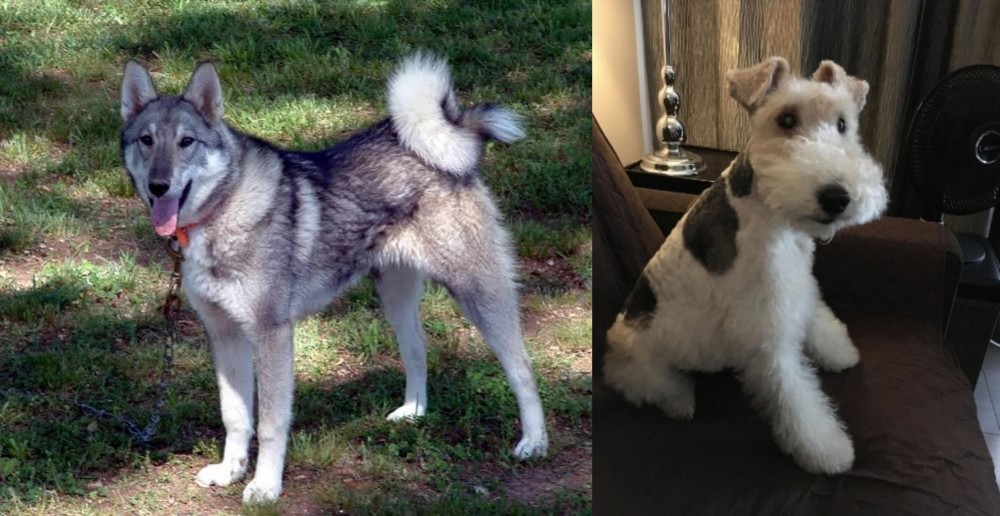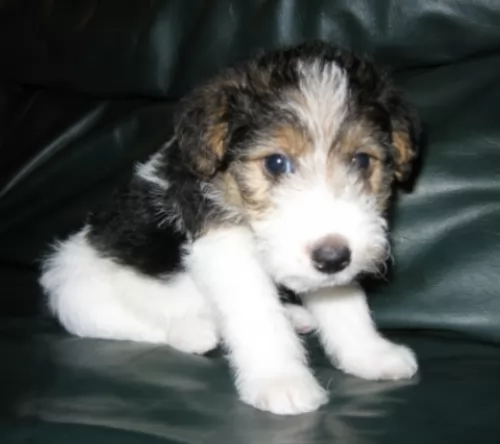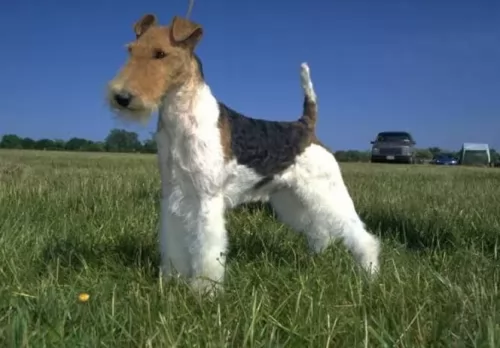 Petzlover
Petzlover West Siberian Laika is originated from Russia but Wire Haired Fox Terrier is originated from United Kingdom. West Siberian Laika may grow 23 cm / 10 inches higher than Wire Haired Fox Terrier. West Siberian Laika may weigh 14 kg / 31 pounds more than Wire Haired Fox Terrier. Both West Siberian Laika and Wire Haired Fox Terrier has same life span. West Siberian Laika may have more litter size than Wire Haired Fox Terrier. West Siberian Laika requires Low Maintenance. But Wire Haired Fox Terrier requires Moderate Maintenance
West Siberian Laika is originated from Russia but Wire Haired Fox Terrier is originated from United Kingdom. West Siberian Laika may grow 23 cm / 10 inches higher than Wire Haired Fox Terrier. West Siberian Laika may weigh 14 kg / 31 pounds more than Wire Haired Fox Terrier. Both West Siberian Laika and Wire Haired Fox Terrier has same life span. West Siberian Laika may have more litter size than Wire Haired Fox Terrier. West Siberian Laika requires Low Maintenance. But Wire Haired Fox Terrier requires Moderate Maintenance
 The West Siberian Laika come from the Khanty and Mansi tribes of West Siberia and Ural. They are a primitive breed used for hunting and come from the spitz and wolf lines. They retain many of their primitive looks and traits to this day. They were pre-historic companions to human hunters and remain so today in the northern regions of the Russia. They were never sled dogs but pure hunters throughout their journey to a domesticated breed. They hunted in the forests of the mountainous regions and were adapted to hunting in the woods. When their prey was hunted almost to extinction, the Laikas were also in danger of disappearing.
The West Siberian Laika come from the Khanty and Mansi tribes of West Siberia and Ural. They are a primitive breed used for hunting and come from the spitz and wolf lines. They retain many of their primitive looks and traits to this day. They were pre-historic companions to human hunters and remain so today in the northern regions of the Russia. They were never sled dogs but pure hunters throughout their journey to a domesticated breed. They hunted in the forests of the mountainous regions and were adapted to hunting in the woods. When their prey was hunted almost to extinction, the Laikas were also in danger of disappearing.
From the early days of the 1900’s through the first World War, there were several campaigns to save the WSL from extinction. A breed standard was developed around the 1930’s. Following the war the breeding programs became more uniformed and followed the standard that was in place. World War II disrupted it again, but once again it was resumed after the war.
The breed was once again threatened by industrialization and deforestation in the early 20th century, as they were replaced by newer, more popular breeds. There were thought to be dozens of aboriginal Laikas with various groups attached to different groups of indigenous hunters.
Following the second World War and the ever increasing detail of breed standards, the Laikas were divided into four pure bred groupings: the West Siberian Laika, the East Siberian Laika, the Russ-European Laika and the Karelo-Finnish Laika. All of these breeds are Laikas because they are bark pointing hunters.
They were imported to the U.S. in the early 1990’s by a Russian immigrant. Vladmir Beregovoy is credited with bringing the breed to the States. There are now about 300-400 West Siberian Laika’sin the U.S. They are a very emotional breed, very in touch with his human’s feelings, habits and intentions. He is a barker for sure who hates to be left alone. An intense breed with the need for companionship and a purpose. They will do anything to escape a pen if left alone for long periods of time.
The breed is protective of its people with other animals and some are wary of strangers. He needs an active family to match his active spirit. They will bark at all wild life including all the squirrels in your yard. So if don’t want a “barker”, don’t get a West Siberian Laika.
They are recognized by the United Kennel Club, the American Canine Association the Dog Registry of American and the Federation Cynologique Internationale
 The Wire Haired Fox Terrier originates in England, and it is thought that the dog developed from the white English Terrier being crossed with the Bull Terrier and maybe even the Beagle.
The Wire Haired Fox Terrier originates in England, and it is thought that the dog developed from the white English Terrier being crossed with the Bull Terrier and maybe even the Beagle.
The hunting crowd wanted a dog that was small enough to disappear down a hole to flush out a fox.
Even though the Wire Haired Fox Terrier used to be a pet of Queen Victoria as well as King Edward VII, it only became popular as a family pet in the 1930s.
 The WSL comes from the Spitz line and also directly descendent from the wolf. They look and act a lot like a wolf in many ways. They have retained much of their primitive traits. With a pointed, long muzzle, an almost square head, and square body, they have wolf colored coats of gray and red. They are mostly medium in size but some can be smaller or larger. Their head is shaped like a wedge, their eyes are typical almond shape and set deep in their head. They are brown or even darker. The muzzle is almost as long as the skull. Their lips are thin and black. The ears are straight up and pricked.
The WSL comes from the Spitz line and also directly descendent from the wolf. They look and act a lot like a wolf in many ways. They have retained much of their primitive traits. With a pointed, long muzzle, an almost square head, and square body, they have wolf colored coats of gray and red. They are mostly medium in size but some can be smaller or larger. Their head is shaped like a wedge, their eyes are typical almond shape and set deep in their head. They are brown or even darker. The muzzle is almost as long as the skull. Their lips are thin and black. The ears are straight up and pricked.
They have bodies longer than they are tall with a lot of musculature. They carry their tail high over their backs. With straight legs and forward feet, with gray, red and white coats, they still look like wild dogs.
 The Wirehaired Fox Terrier is a medium-sized dog, standing at between 33 and 38cm in height and weighing between 6 and 9 kg.
The Wirehaired Fox Terrier is a medium-sized dog, standing at between 33 and 38cm in height and weighing between 6 and 9 kg.
The face is fairly long and he has semi-erect, semi-floppy ears and the high set tail is usually docked. The double coat is wiry, curly and coarse and is essentially white with tan or black markings. White is always the predominant color of the Wire Haired Fox Terrier.
This little dog is cheerful, cheeky, playful, feisty, lovable and full of the joys of life. He is also strong-willed and independent.
He makes a great playmate for kids and loves being in the company of his human family. He will get on well with other pets in the family too.
He is intelligent which means you can have him easily trained and socialized and the kids will love to teach him some tricks too. He is a high energy dog and will require a good dose of exercise.
 3.Adaptability This is not really an apartment dog though he can adapt. He needs outdoor space to run everyday. So if in an apartment find a dog park for everyday use.
3.Adaptability This is not really an apartment dog though he can adapt. He needs outdoor space to run everyday. So if in an apartment find a dog park for everyday use.
4.Learning ability – Highly trainable and very smart. Independent thinker though might cause some issues.
 One thing is for sure – when you bring a Wire Haired Fox Terrier into your home, you’re going to have a dog with endless energy. It is why they make such good pets when you’ve got kids in the house.
One thing is for sure – when you bring a Wire Haired Fox Terrier into your home, you’re going to have a dog with endless energy. It is why they make such good pets when you’ve got kids in the house.
They like to please their owners and they respond well to training and socialization. They’re also brave and protective, making good watchdogs.
They’re loving, loyal and companionable, and there are plenty of stories about the loyalty of these dogs. Anyone who has had one of them as a pet will tell you what splendid dogs they are.
 Health wise there are no genetic health issues known today. Since they were so wild, primitive and isolated there was not a lot of inbreeding to any standards. There are however some interesting health facts about the WSL.
Health wise there are no genetic health issues known today. Since they were so wild, primitive and isolated there was not a lot of inbreeding to any standards. There are however some interesting health facts about the WSL.
• Females only come into estrus once a year, usually in the late winter. They are usually one to two or two and a half years old when this happens. The Russians who know them best frown on breeding them before they are at least two.
• They are subject to many of the same parasites and some diseases like any other canine. But they are not susceptable to any illness specific to their breed.
• Hunting accidents might bet he biggest health threat this breed faces at the moment.
• However with more dogs being bred for the show ring, this could all change and genetic issues could begin to pop up for them.
 These robust little dogs can succumb to any one of the many common dog illnesses there are -
These robust little dogs can succumb to any one of the many common dog illnesses there are -
The Wirehaired Foxy is a healthy dog, but it is thought that Epilepsy could be a problem with this breed. Your spunky dog may seem a little bit confused before he falls to the floor lying on his side and twitching like he’s having a bad dream.
This is brought on by uncontrolled bursts of electrical activity in the dog’s brain. The seizure can last for a minute or so but even so, whether it is a twitch or violent shuddering, it can leave you shocked and disturbed.
He can sometimes even urinate during the seizure. It is imperative to get your pet to the vet who will know precisely how it can be controlled.
Dental disease is also a common problem with dogs and unfortunately, your Wire Haired Fox Terrier also battles with this. The problem starts with tartar build-up on the teeth and then it can cause infection of the gums and roots of the teeth.
Left unattended to, your pet could lose his teeth, and it jeopardizes your pet’s health as well.
 performance, working dog food. High in protein and fat is needed to maintain their lean muscle. Don’t over feed them as they will become obese and they will be unhappy if their physical activities are restricted, even if by their own weight. Be sure you break up their day’s food amount into 3-4 smaller meals.
performance, working dog food. High in protein and fat is needed to maintain their lean muscle. Don’t over feed them as they will become obese and they will be unhappy if their physical activities are restricted, even if by their own weight. Be sure you break up their day’s food amount into 3-4 smaller meals.
2.Feeding the adult – Almost everything is equally true for the adult. They need a high protein and high fat food – a high performance food. Don’t over feed and give them at least 2 meals per day.
3.Points for Good Health – as previously mentioned this is a hardy and robust breed,
4. Games and Exercises They need a lot of exercise, have a strong prey drive and are very intelligent. A dog with those traits that does not get enough exercise will drive you crazy if he is not stimulated.
 Groom your pet. Brush twice weekly. Wire Haired Fox Terrier owners like to hand their pets in at professional groomers to have their hair cut short and made more manageable. The hair is kept quite long around the muzzle.
Groom your pet. Brush twice weekly. Wire Haired Fox Terrier owners like to hand their pets in at professional groomers to have their hair cut short and made more manageable. The hair is kept quite long around the muzzle.
Provide your pet with the best food there is. Always buy high quality food that can contribute to your pet’s health and which is suitable for his size, age and activity levels. The Wire Haired Fox Terrier is inclined to be a greedy dog and with a dog like this weight gain can slowly increase and can become a health problem.
Spay or Neuter. This is an excellent idea for your pet if you don’t want puppies. Not only that, spaying or neutering actually decreases the likelihood of your pet getting some types of cancer.